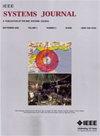Probability-Constrained Multisensor Distributed Fusion Filtering for Cyber-Physical Systems
IF 4.4
3区 计算机科学
Q1 COMPUTER SCIENCE, INFORMATION SYSTEMS
引用次数: 0
Abstract
This article makes one of the first few attempts to investigate the multisensor distributed fusion filtering problem for a special type of time-varying nonlinear stochastic cyber-physical systems (CPSs) via encoding–decoding strategy (EDS) within the finite-horizon probability constraint framework. The random EDS is employed to orchestrate the data transmissions between sensors and remote local filters to enhance the resource-utilization efficiency and data security. A novel probability-constrained distributed fusion filtering (DFF) scheme is established such that the prescribed probabilistic ellipsoidal constraints and stochastic面向信息物理系统的概率约束多传感器分布式融合滤波
本文首次尝试在有限视界概率约束框架下,利用编解码策略研究一类特殊时变非线性随机网络物理系统的多传感器分布式融合滤波问题。利用随机能谱来编排传感器与远程本地滤波器之间的数据传输,提高了资源利用效率和数据安全性。建立了一种新的概率约束分布式融合滤波(DFF)方案,该方案使局部滤波和融合滤波误差满足规定的概率椭球约束和随机$H_{\infty }$干扰衰减指标。首先通过迭代求解一系列矩阵不等式,给出了期望局部滤波器存在的充分条件。然后,通过求解一定的优化问题,以最大化融合滤波误差的椭球集约束概率为目标,设计了衍生的多传感器分布式融合滤波器。最后,通过一个算例验证了分布式融合滤波方法的有效性。
本文章由计算机程序翻译,如有差异,请以英文原文为准。
求助全文
约1分钟内获得全文
求助全文
来源期刊

IEEE Systems Journal
工程技术-电信学
CiteScore
9.80
自引率
6.80%
发文量
572
审稿时长
4.9 months
期刊介绍:
This publication provides a systems-level, focused forum for application-oriented manuscripts that address complex systems and system-of-systems of national and global significance. It intends to encourage and facilitate cooperation and interaction among IEEE Societies with systems-level and systems engineering interest, and to attract non-IEEE contributors and readers from around the globe. Our IEEE Systems Council job is to address issues in new ways that are not solvable in the domains of the existing IEEE or other societies or global organizations. These problems do not fit within traditional hierarchical boundaries. For example, disaster response such as that triggered by Hurricane Katrina, tsunamis, or current volcanic eruptions is not solvable by pure engineering solutions. We need to think about changing and enlarging the paradigm to include systems issues.
 求助内容:
求助内容: 应助结果提醒方式:
应助结果提醒方式:


